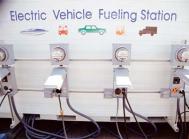THERE’S NO GETTING away from it: when it comes to the environment, cars are firmly in the ‘baddies’ camp. They pollute our cities, clog up our streets and are a major factor in greenhouse-gas emissions, contributing to global warming. Here are some small steps to improve your own carbon footprint on the world.
Keep an eye on your speed. It might take longer to get somewhere, but driving at 50mph uses considerably less fuel than driving at 70mph – which uses up to 24% more.
Keep it steady. Slower accelertion and braking reduce fuel consumption and decrease the wear on your car’s parts.
Get rid of unnecessary weight and increase your car’s efficiency. A roof rack or cycle carrier can increase fuel consumption by as much as 30%.
Keep your car maintained. This will ensure optimum performance, limit your fuel consumption and keep your car on the road for longer.
Get used to planning. Co-ordinate activities so that you need to make fewer journeys. Choose less congested routes wherever you can.
Consider sharing. Around 60% of the cars on the road at any one time have just one person in them. This creates congestion and means that emissions are much higher than necessary. Lift-sharing can be a good way of reducing emissions and of cutting down the cost of journeys. You could also share your car with others or join a car club. Please visit Share A Journey
Carplus www.carclubs.co.uk
(tel: +44 (0)113 234 9299), or Liftshare www.liftshare.co.uk
(tel: + 44 (0)8700 780 225).
Switch off your engine if you are stationary for longer than two minutes.
Think twice. Is your journey necessary? Can you get to your destination by public transport? Share a lift? Walk? Cycle? Short journeys use more fuel and reduce the car’s lifespan.
Use your gears wisely. It’s more efficient to use the higher gears where it’s practical. Think carefully about when you need to use air conditioning and heaters. They reduce the car’s power and increase fuel consumption.
BUYING NEW
Consider carefully the size of car you need and don’t buy a bigger one. Look at the fuel consumption and CO2 emissions of the car that you’re planning to buy. The Environmental Transport Association (ETA) brings out an annual car buyers’ guide which rates new cars on environmental and safety performance. Please visit www.eta.co.uk or tel: + 44 (0)800 212 810 for a copy of the latest edition.
Another decision you’ll have to make is whether to go for petrol or diesel. Diesel cars are more fuel efficient and produce less CO2, carbon monoxide and hydrocarbons. However, they emit more of other pollutants that contribute to poor urban air quality. The advantage of buying a diesel car is the opportunity to use biodiesel to fuel it. Biodiesel can be made from a range of sources, including waste oil from chip shops, oil seed rape and palm oil.
Using 100% biodiesel means that you won’t be adding to global warming as it doesn’t add any more carbon to the atmosphere. Even by using a blend of biodiesel and regular diesel, you’ll still be reducing the demand for fossil fuels. However, try to use biodiesel from sources other than palm oil, as many palm-oil plantations in the Far East involve the destruction of local old-growth forests and the wildlife they support. Visitwww.biodieselfillingstations.co.uk or www.greenbiodiesel.com, or tel: + 44 (0)1543 454 475.
Another thing to consider when buying new is whether or not to go for a car that incorporates new technology. Hybrid cars combine a petrol engine with an electric motor. Consequently, these are a much better green option, with lower greenhouse-gas emissions. Honda and Toyota both currently offer hybrid options. If you live in an urban area and don’t tend to drive far, you could opt for a fully electric car. You won’t be buying it for its speed performance – its maximum is unlikely to be more than 40 mph – but it’s a cheap car to both buy and run.
URBAN 4X4S
SUVs (sports utility vehicles), or urban 4x4s, have been demonised by environmental campaigners in recent years. As well as being the bane of cyclists, SUVs can emit twice as much carbon monoxide, hydrocarbons and nitrogen dioxide as smaller cars. These chemicals cause pollutants to build up in our cities, leading to poor air quality and smog. The high fuel consumption of SUVs also means that they are big contributors to CO2 emissions. On top of that, although these vehicles might have been bought for safety reasons, insurers claim that they are involved in a quarter more accidents than saloon cars and are likely to do more damage. SUVs are bottom of the class when it comes to pedestrian safety, because of their height and weight.
For more details about how to buy and run an ‘ethical’ car read Ethical Consumer’s July/August 2005 climate change issue. Visit www.ethicalconsumer.org or tel: +44 (0)161 226 2929 for more information.








